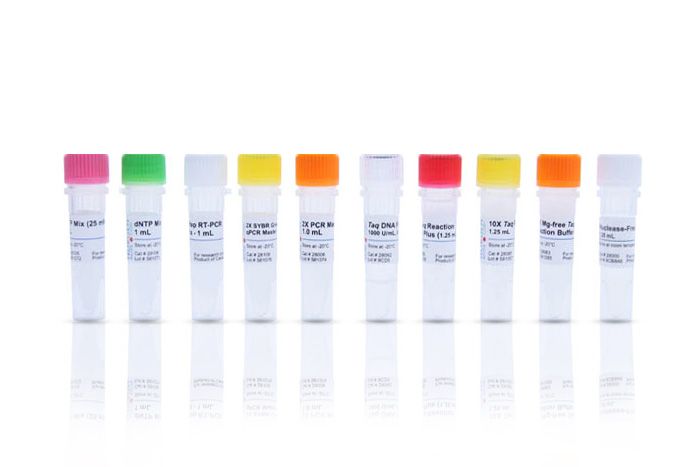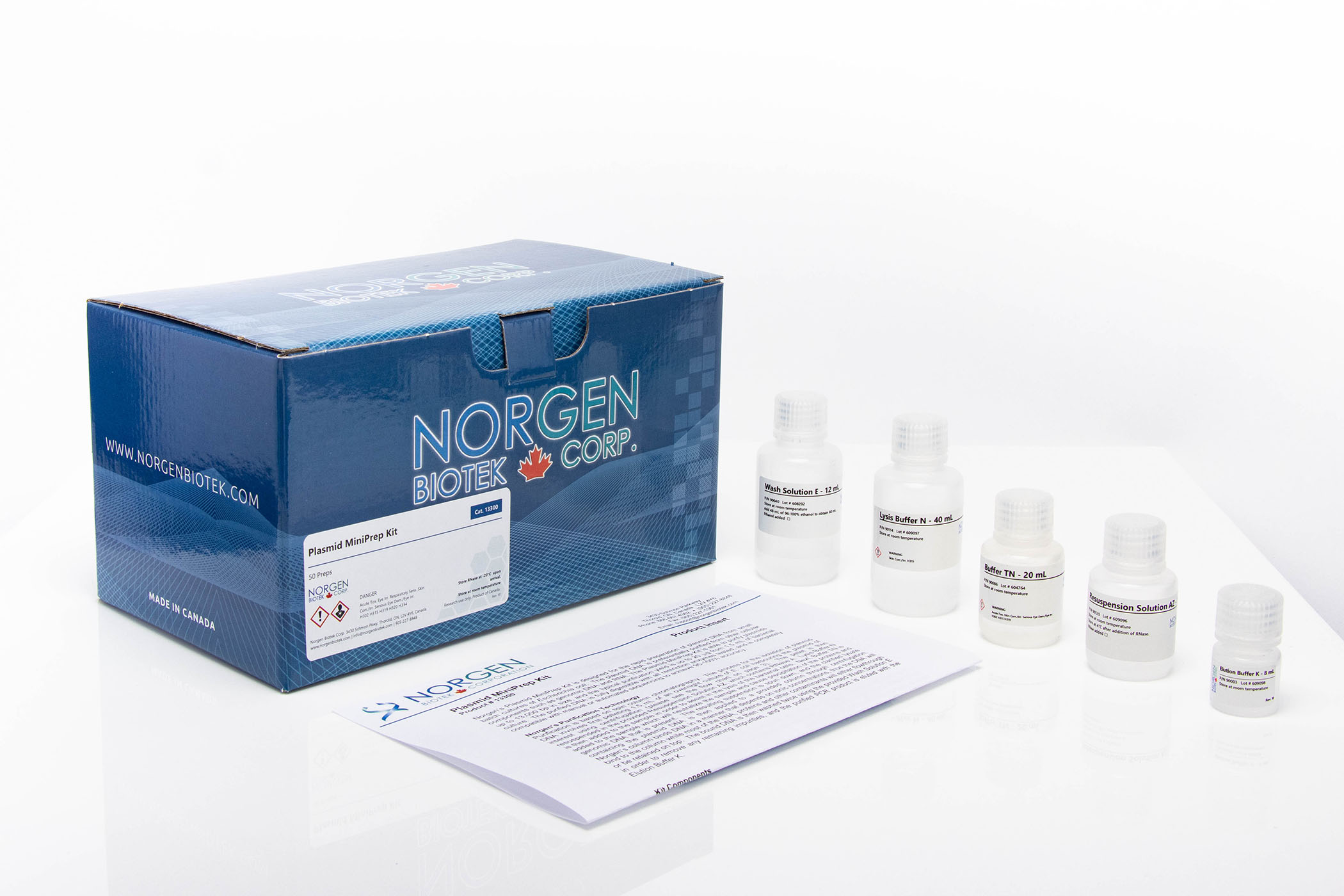Homologous Recombination Assay Kit
Rapid and sensitive tool for measuring the efficiency of homologous recombination

For research use only and NOT intended for in vitro diagnostics.
Homologous Recombination Assay Kit
Rapid and sensitive tool for measuring the efficiency of homologous recombination
Register today to receive an exclusive 15% off* on your first order.
Features and Benefits
- Rapid and sensitive tool for measuring the efficiency of homologous recombination
- For any cell types including prokaryotes and eukaryotes
- All primers included for quantification of the homologous recombination efficiency through qPCR.
Norgen’s Homologous Recombination Assay Kit provides a rapid and sensitive tool for measuring the efficiency of homologous recombination in both bacterial and mammalian cells. The kit consists of 5 components: (1) dl-1 plasmid, (2) dl-2 plasmid, (3) positive control plasmid, (4) assay primers mixture, and (5) universal primers mixture. The assay is based on the co-transformation of the two dl plasmids into bacterial cells followed by the isolation of plasmid DNA and quantification of the homologous recombination efficiency through qPCR. In addition, PCR can be used for qualitative analysis of the recombination efficiency. The primer mixture provided with the kit is designed to amplify only the homologous recombination product but not the dl plasmids (dl-1 or dl-2). The two plasmids can be co-transfected into mammalian cells, then the DNA can be isolated and the homologous recombination efficiency can be assayed by qPCR (or PCR). In addition, the efficiency of homologous recombination can be assessed in bacteria by blue/white screening using X-gal. The provided positive control contains the functional LacZ sequence and can be used as a positive control for the plasmid DNA isolation efficiency (after transformation or transfection) or PCRs. The use of PCR-based homologous recombination assay enhances the sensitivity and eliminates the need for labor intensive screening by using traditional protein expression and staining techniques and is suitable for high throughput screening studies. The kit is designed to perform 200 transformations or 24 transfections.
Details
Supporting Data
Figure 1. Schematic Representation of Homologous Recombination Assay. The lacZα coding region of the positive control plasmid was mutated and two plasmids with different mutations were generated. Therefore, the two plasmids containing different defective lacZα cassettes can form a functional lacZα cassette through intermolecular homologous recombination. The two defective plasmids, once transformed into bacterial cells, will form white colonies. Only the plasmid that has undergone homologous recombination and generated the functional lacZα can form blue colonies. The homologous recombination efficiencies can be determined by calculating the percentages of the blue colonies among all the blue and white colonies.
Figure 2: Real-time PCR Amplification of Plasmid DNA Isolated from HEK 293 Cells. Aftter transfection with the supplied plasmids genomic DNA was isolated from each well of a 6-well plate using Norgen’s RNA/DNA/Protein Purification Kit. Fifty nanograms of the positive control plasmid was transfected into each well of the HEK 293 cells, and the total DNA was isolated 12 h later. For the recombinant samples, 25 ng of dl-1 plus 25 ng of dl-2 were transfected and then isolated. For the negative controls, 50 ng of dl-1 or 50 ng of dl-2 were transfected and then isolated. The experiment was carried out in duplicate to avoid the reading error of the PCR machine.
SHELF LIFE AND HANDLING
All solutions should be kept tightly sealed and stored at -20°C or lower temperature. This kit is stable for 5 years after the date of shipment.
| Kit Component | Cat. 35600 (200 transformations/24 transfections) |
|---|---|
| dl-1 Plasmid | 12 μg (50 ng/μL) |
| dl-2 Plasmid | 12 μg (50 ng/μL) |
| Positive Control Plasmid | 5 μg (50 ng/μL) |
| Assays Primers Mixture | 400 μL |
| Universal Primers Mixture | 400 μL |
| Nuclease-Free Water | 1.25 mL |
| Product Insert | 1 |
Documentation
Citations
| Title | Blocking lipid synthesis induces DNA damage in prostate cancer and increases cell death caused by PARP inhibition |
| Citation | Science Signaling 2024. |
| Authors | Caroline Fidalgo Ribeiro1 †, Silvia Rodrigues1 †, Debora Campanella Bastos2, Giuseppe Nicolò Fanelli3 , Hubert Pakula1 , Marco Foiani4 , Giorgia Zadra5 , Massimo Loda |
| Title | Suppression of NBS1 Upregulates CyclinB to Induce Olaparib Sensitivity in Ovarian Cancer |
| Citation | Technology in Cancer Research & Treatment 2024. |
| Authors | Ailing Zhong, MMed1,* , Chien-shan Cheng, MD2 , Ren quan Lu, PhD1,3, and Lin Guo, PhD |
| Title | 14-3-3sigma Contributes to Radioresistance by Regulating DNA Repair and Cell Cycle via PARP1 and CHK2 |
| Citation | Molecular Cancer Research 2017. |
| Authors | Chen, Y., Li, Z., Dong, Z., Beebe, J., Yang, K., Fu, L., & Zhang, J. T. |
| Title | Significance of cyclin D1 overexpression in progression and radio-resistance of pediatric ependymomas |
| Citation | Oncotarget 2017. |
| Authors | Liang, M. L., Hsieh, T. H., Liu, Y. R., Chen, Y. W., Lee, Y. Y., Chang, F. C., ... & Yen, Y. (2018). |
| Title | Protein-Protein Interaction Inhibitors of BRCA1 Discovered Using Small Molecule Microarrays |
| Citation | Small Molecule Microarrays 2016. |
| Authors | Na, Z., Pan, S., Uttamchandani, M., & Yao, S. Q |
| Title | Hypoxia differentially modulates the genomic stability of clinical-grade ADSCs and BM-MSCs in long-term culture |
| Citation | Stem Cells 2015. |
| Authors | Nicolas Bigot1,2,3, Audrey Mouche1,2,3, Milena Preti4,5,6, Séverine Loisel1,2,3, Marie-Laure Renoud4,5,6, Rémy Le Guével2,7, Luc Sensebé4,5,6, Karin Tarte1,2,3,8 andRémy Pedeux1,2,3,* |
| Title | Targeting MPS1 Enhances Radiosensitization of Human Glioblastoma by Modulating DNA Repair Proteins |
| Citation | Molecular Cancer Research 2015. |
| Authors | UB Maachani, T Kramp, R Hanson, S Zhao, O Celiku, U Shankavaram, R Colombo, NJ Caplem, K Camphausen, A Tandle |


